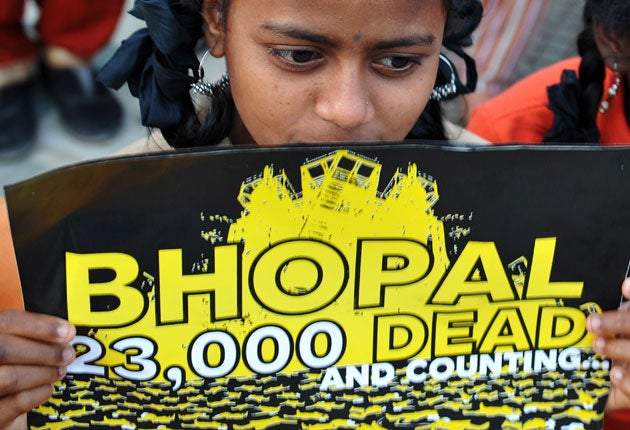Seven found guilty of Bhopal gas tragedy

Seven former chemical company executives were today convicted of "death by negligence" for their roles in the Bhopal gas tragedy that killed 15,000 people more than 25 years ago in the world's worst industrial disaster.
Their firm, Union Carbide India Ltd., was convicted of the same charge. But the company no longer exists.
The former employees, many of them in their 70s, face up to two years in prison. The judge did not immediately announce sentences.
Large groups of survivors and relatives, along with rights activists, gathered in the city saying the verdict was too little, too late.
Early on December 3, 1984, a pesticide plant run by the subsidiary of US company Union Carbide leaked about 40 tons of deadly methyl isocyanate gas into the air in Bhopal in central India, quickly killing about 4,000 people. The lingering effects of the poison raised the death toll to about 15,000 over the next few years.
Local activists insist the real numbers are almost twice that, and say the company and government have failed to clean up toxic chemicals at the plant, which closed after the accident.
The verdicts, which were in a local court and are likely to be appealed, came as the case crawled through India's notoriously slow and ineffective judicial system.
India's Central Bureau of Investigation, the country's top investigative agency, had originally accused 12 defendants: eight senior Indian company officials; Warren Anderson, the head of Union Carbide at the time of the gas leak; the company itself and two subsidiary companies.
Union Carbide was bought by Dow Chemical in 2001. Dow says the legal case was resolved in 1989 when Union Carbide settled with the Indian government for 470 million dollars, and that all responsibility for the factory now rests with the government of the state of Madhya Pradesh, which now owns the site.
Last July, the same court in Bhopal had issued a warrant for Anderson's arrest and also ordered the Indian government to press Washington for his extradition.
Anderson was briefly detained immediately after the disaster, but he quickly left the country and now lives in New York. It was not immediately clear if the Indian government had begun to process the Bhopal court's request. Extradition proceedings are usually mired in a complex tangle of legal paperwork and can take years to complete.
Investigators say the accident occurred when water entered a sealed tank containing the highly reactive gas, causing pressure in the tank to rise too high.
Union Carbide said the accident was an act of sabotage by a disgruntled employee who was never identified. It has denied the disaster was the result of lax safety standards or faulty plant design, as claimed by some activists.
The Central Bureau of Investigation said the plant had not been following proper safety procedures.
Join our commenting forum
Join thought-provoking conversations, follow other Independent readers and see their replies
Comments
Bookmark popover
Removed from bookmarks